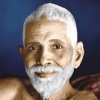-
15th March 2007, 06:31 AM
#1
Senior Member
Veteran Hubber

The 3 Pillars Of Hinduism.
Dvaitham, Advaitham, Visishta Dvaitham.
Dvaitham - The Belief Of Duality. The Being is Different from the Paramathma or the SUPER SOUL which Governs Everything In the Universe. The Soul of the Being can Never be a part of the Super Soul.
Advaitham - The Jva is not a part of the Paramathma but is the Paramathma. There is no difference between the two. (this is the thought that is believed by Aadhi Shankarachariyar, Rama Krishna Paramahamsar, Swamy Vivekananda.
Visishta Advaitham: Everything, including Atman, is a part of Brahman but is not Brahman itself, just like a grain of sand on the beach or a seed in a jackfruit are part of the beach or the jackfruit, but are not equal to the beach or the jackfruit.
Although it is Advaitham that is most popular, most humans practice Dvaitham in Reality.
Please Use This Thread To Discuss Them. Post more abt them. Correct any discrepancies in my post. etc etcl 
-
15th March 2007 06:31 AM
# ADS
Circuit advertisement

-
15th March 2007, 06:49 AM
#2
Senior Member
Veteran Hubber
-
15th March 2007, 06:54 AM
#3
Moderator
Veteran Hubber

Re: The 3 Pillars Of Hinduism.

Originally Posted by
Surya
Dvaitham, Advaitham, Visishta Dvaitham.
Advaitham - The Being is Always and Always will be a Part of the Paramathma. One just has to come to a Realization. (this is the thought that is believed by Aadhi Shankarachariyar, Rama Krishna Paramahamsar, Swamy Vivekananda.
Please Use This Thread To Discuss Them. Post more abt them. Correct any discrepancies in my post. etc etcl

Just a small correction on the Advaithic thought - The Jva is not a part of the Paramathma but is the Paramathma. There is no difference between the two. Part of is the Vishishtadwaita thought.
Happy discussions.
When we stop labouring under the delusion of our cosmic self-importance, we are free of hindrance, fear, worry and attachment. We are liberated!!!
-
15th March 2007, 07:29 AM
#4
Senior Member
Veteran Hubber

Badri nna ....
Adwaitam 101 .... naan romba naalaa ungalai kettu kondiruppadhu 
ingayaavadhu neenga share pannalaam !
-
15th March 2007, 01:47 PM
#5
Senior Member
Diamond Hubber
Anbe Sivam

-
15th March 2007, 06:55 PM
#6
Senior Member
Seasoned Hubber
Nice thread Surya !
Hope to see some healthy discussions here
-
15th March 2007, 07:36 PM
#7
Senior Member
Senior Hubber

I think it is actually called "Vishishta Advaita", not "Vishishta Dvaitham". As Badri ayya pointed out, what you have given as the description of Advaita is closer to Vishishta Advaita.
Advaita: Atman is Brahman. Atman is wholly Brahman. Only Atman is Brahman. Nothing but Atman is Brahman. Everything else is delusion.
Vishishta Advaita: Everything, including Atman, is a part of Brahman but is not Brahman itself, just like a grain of sand on the beach or a seed in a jackfruit are part of the beach or the jackfruit, but are not equal to the beach or the jackfruit.
I am not a philosopher, sorry if I have made a mistake. 
ni enna periya podalangai-nu ennama?
-
15th March 2007, 09:08 PM
#8
Senior Member
Senior Hubber
Advaita-
ADVAITA: -
Dr. V S SARMA in his book, Sri Sankara the Poet, speaks about Advaita as follows:-
The Advaita Philosophy taught and propagated by Sankara was there expressly or by implication right from the time of Vedas. However through the commentaries, on Brahmasutra, Uapnishads, and Bhagvadtgita -i.e. the three main schools of Nyaya, Sruti, and Smriti it was Sankara who gave Advaita, religion a permanent place in Indian thought.
That beyond noting exists, that which is smaller than atom bigger than the biggest thing, that which has no beginning and no end, that which cannot be expressed in words, that one and only reality that is Brahman. There are indications in the Upanishads about this Brahman. The Vakyapadeeyam og Bhartrihari who lived before Sankara begins with a reference to his Brhaman. Gaudapada who wrote Mandukya karika and his disciples and Snakra’s mentor Govinda Bhagvatpada were also Advaitins.
The realization of the Brahman is the ultimate goal of life. The desire to know Brahman is the quest for the ultimate reality. In order to achieve this goal one should acquire the knowledge to discriminate between what is transitory and what is permanent. He must renounce the world, one’s children the fruit of one’s labor, sexual enjoyment. He must attain self control, sublimation, concentration and liberation. Then he becomes eligible to acquire the knowledge of Brahman.
Sankara described this as the four types of ascesis. It is through ignorance that we retain our link with this world of change, the Samsara. The nature of the soul is freedom, when ignorance comes to an end, the soul freed from its link with Samsara. We think we are distinct from Brahman because of our ignorance. When we acquire real knowledge we lose the sense of being different. We lose our individuality and identity. Liberation comes through knowledge. Then we realize Brahman.
The eternal and soul and the individual souls are one and the same. We also realize that Brahman is the ultimate reality ultimate truth. At that stage the sense of identity disappears. One realizes one is not different from Brahman. No difference between the real and the unreal. The way to liberation is based realizing that the sense of difference is also an illusion. Life is nothing but Brahman. This is the substance of Advaita wisdom.
In order to reach this point ignorance and illusion must be destroyed. Sankara gives prominence to distinguishing between Brahman with no qualities and Brahman with quality. He also emphasized the fact that world is an illusion. The liberation can be achieved through knowledge. He also gives prominence to the awareness of Brahman without qualities. Reality of the every day is distinguished from the ultimate reality. The world and every day life do not posses ultimate reality. It belongs to the world of relative reality of every day life. Ultimate reality alone is true. Our ideas about God belong to the world of every day reality. To meditate on God is one of the ways to the realization of Brahman. If one attains this knowledge of Brahman then he is liberated from life. For a person who has the knowledge of Brahman will also receive in course of time through devotion and hope in God, immediate release and release in stages. If through knowledge ignorance is removed one attains Brahman. Then the difference between individual soul and Brahman disappears.
Sankara speaks about three types of reality-Phenomenal, reality of every day life, and the ultimate reality. Mistaking a piece of rope in the dark for a snake is phenomenal reality. The reality of every day life is like gold and gold ornaments. Gold can be worked into different forms. But every thing is gold. The gold corresponds to the reality of every day work. The ultimate truth is behind time and space. It has no beginning or end. It has no possibilities of change.
Sankara speaks about six principles of knowing-
1. what is immediately evident
2. what can be inferred
3. inference from an inference
4. conclusion,
5. logical thinking and
6. Absence of a thing.
Actions are of three kinds- those performed in accordance with one’s earlier life; those appearing as emanation from an instinct; and those performed during one’s life.
When a person dies his body decays and his life breaks up into five elements and continue as the subtle body. This continues its journey.
Life is a quest to find out what Brahman is and what is real. As we come across each thing and examine it we say this is not, this is not Brahman. . The liberated person acquires knowledge that what is real is Brahman and the world is an illusion. Though Advaita philosophy is the source of all subsequent philosophies it may be said to have existed even before Sankara. It was he who gave Advaita pre-eminent position in India thought. He also composed several works expounding this philosophy and contributed greatly to its contribution as a great school of thought. DR. S RADHAKRISHANA SAYS “SANKARA’S ADVAITA IS A LINE OF THOUGHT, RESULTING FROM BOLD INTELLECTUAL ACTIVITY AND SUBTLE LOGICAL ARGUMENTATION. It is a model of a great and holy vision of life”
-
16th March 2007, 03:51 AM
#9
Senior Member
Senior Hubber
Hello friends  ,
,
Before posting anything in this thread, let me make this clear.
I am going to participate in this thread only to state facts and not to refute any of the stated three doctrines, as I have already done that in other threads.
In other words, I intend to limit my posts
- 1. To discuss the topic within its scope.
2. To request definitions of the terms, concepts and/or words that may become necessary to avoid ambiguous explanations getting through without being challenged.
3. To draw readers' attentions to contradictions, fallacies and blunders as and when they may be committed.
4. To add information and/or facts with an intention to clarify ambiguous statements as and when they may occur.
Therefore, I would kindly request all active participants to discuss this topic from their own autonomous perspectives along with the honesty and analytical depth that is absolutely imperative if the discussion has to serve any useful purpose.
Thank you all in anticipation to your honest and truthful participation.
Let me begin by giving the chronological order in which the stated three doctrines came into existence.
- 1. Advaita or Absolute Monism - GaudaPada/Sankara (Kerala)
2. Vishishtha Advaita or Qualified Monism - Ramanuja (Tamil Nadu)
3. Dvaita or Dualism - Madhava (Karnataka)
In fact, Advaita, Vishishtha Advaita and Dvaita do not constitute the three pillars of Hinduism as claimed and stated by Surya, but they are rather the three "Booms", precisely designed to knock one another down, leaving Hinduism nothing more than a mere "Castle In Air".
The reason is obviously simple:
In his Vishishtha Advaita, Ramanuja critically and thoroughly analyses the Advaita doctrine and furiously criticises it as an utterly illogical doctrine; and in the end, Ramanuja categorically rejects Advaita as an absolutely untenable doctrine.
In his Dvaita doctrine, Madhava completely throws both the Advaita and Vishishtha Advaita doctrines in the bin and declares them as utterly foolish doctrines as both contradict experience.
On the other hand, the Advatins while blindly clinging onto their failing doctrine, charge their opponents as possessing of dull intellect for failing to comprehend Advaita.
Thus, the three doctrines, claimed as the three pillars of Hinduism, are in fact contradictory to one another and thoroughly nullify one another, which consequently leaves Hinduism without any unified, consistent doctrinal support.
And that is an undeniable fact.
With that, I wish you all a thorough enjoyment in the forthcoming discussions.
Good luck! 


-
16th March 2007, 04:40 AM
#10
Senior Member
Veteran Hubber








 Reply With Quote
Reply With Quote





 Badri, Podalangai, and Padmanabha.
Badri, Podalangai, and Padmanabha.
Bookmarks